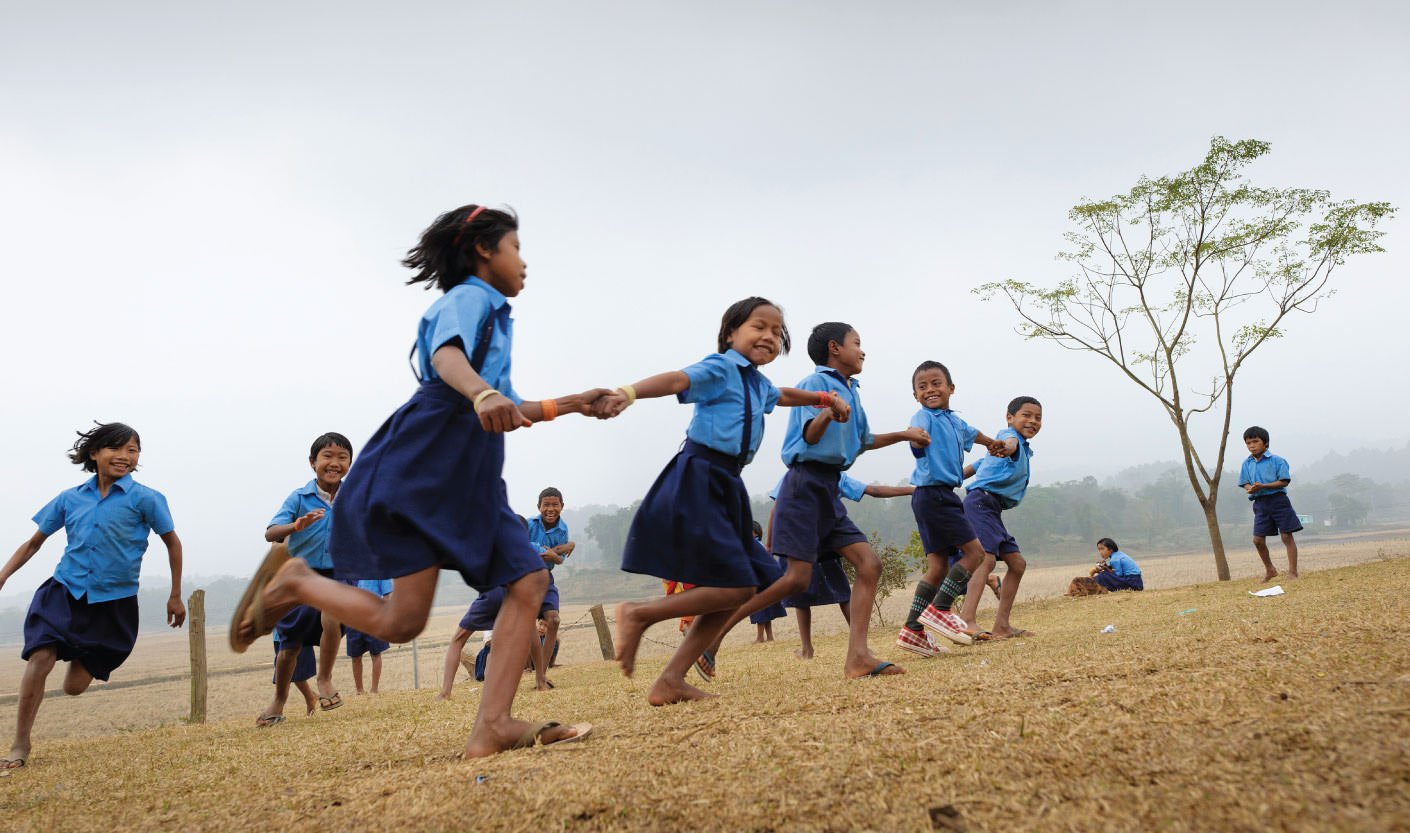
From Here to There
Child sponsorship helped isolated villages in northeast India for more than a decade. Now, with programs winding down, World Vision helps people plan for what’s next.
It’s a walk of little more than 100 yards from the past to the future.
On sandaled feet, 11-year-old Nabami Junuka (precisely “11 years and 7 months,” she says) and her father, Lokhan Rongchon, walk along the narrow, muddy dike of an emerald-green rice field.
Nabami, a World Vision sponsored child, shyly explains that she likes to run and play kabaddi, a fast-moving South Asian tag game, and that she helps her mother clean house and wash dishes — but schoolwork is her focus. Assamese language is her favorite subject. With her father looking on proudly, she says boldly, “I want to be a doctor.”
“I have four children … this [rubber plantation] is for them.”
— Lokhan Rongchon, farmer
For Nabami, the future is full of promise. World Vision’s sponsorship-funded work in her community for the past 15 years — providing opportunities for better healthcare, education, infrastructure, and economic development — has paved the way for this. She and her generation will break the cycle of poverty that has long afflicted the tribal people of northeast India’s Assam state.
Sponsor a child today »Living in isolated mountain communities, they have been rich in tradition and craftsmanship, but dirt-poor in nearly everything else. Lokhan has 11 bighas of land, less than five acres, on which he barely grows enough rice to feed his family; there is none left over to sell. He works in the fields for others, when jobs are available.
But leaving the rice paddy, Lokhan and Nabami climb a steep hillside to arrive at what will make all the difference in his family’s fortunes: his small rubber plantation of 350 trees. With time and care and World Vision’s support, these trees will yield an income for 50 years.
That means Nabami and her siblings don’t have to leave their tribal home and close-knit community to find success. “I have four children,” Lokhan says, gazing at his plantation. “It would be good if they get jobs, but this is for them.”
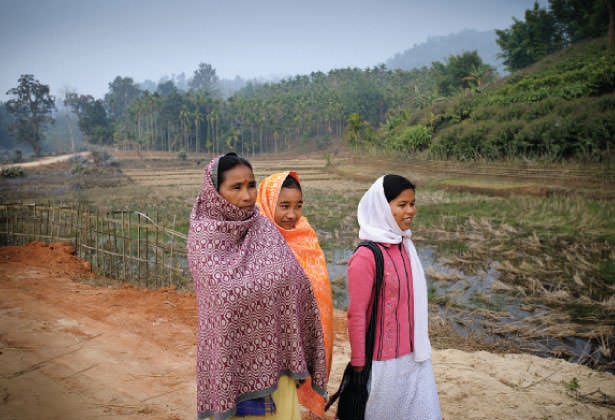
Nabami Junuka (center) and her friends walk alongside rice fields near their village.
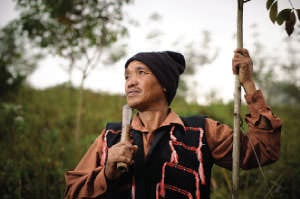
Lokhan cares for his rubber plantation as a legacy for his children.
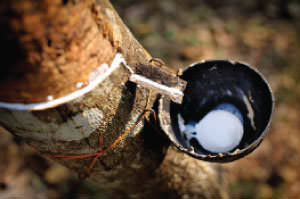
Rubber starts as tree sap and is formed into mats and then dried.

From the tree sap, rubber is pressed into thin mats.

Lokhan has a room full of stacks of the rubber mats.
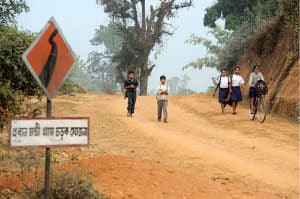
The mountain road connects villagers to schools and markets.
Rooted in Place
World Vision began working in the Amri Karbi area through the Amri Area Development Program in 1997. Today, more than 2,300 children are sponsored, and communities are gearing up to continue the area’s development even after World Vision phases out.
“We must have a better life for the next generation.”
— Kati Rahang, community farmer and advocate
“Our main activities from now until our program closes in 2014 are helping families develop rubber plantations and seeing that young people have training that directly relates to jobs,” says Mukul Borah, manager of World Vision’s Amri development program.
Lokhan’s trees are young and will require four more years of care before they’re ready to be tapped for the milky sap that makes rubber. “This is fertile land, they grow well,” Lokhan says. “All I have to do is clean [the underbrush] about three times a year.”
World Vision’s cash-for-work and food-for-work programs have provided income for the aspiring rubber-growers. Staff also helped families obtain the right to use land that was part of a tribal block. The national Rubber Board conducted training here, and it will monitor production and buy the rubber.
“This plan and other things will change this place,” says Kati Rahang, a rubber farmer and community advocate. He once participated in a village development committee organized by World Vision — now he serves on its successor, the government-funded Amri Karbi Development Council.
“Our way of life can’t go on,” Kati says. “We must have a better life for the next generation.”
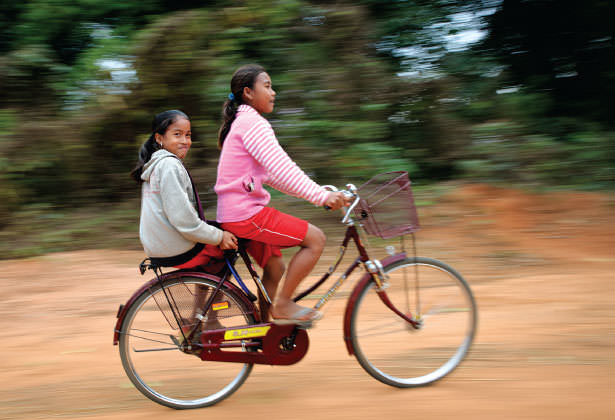
World Vision gave bicycles to 500 girls who needed transportation to school.
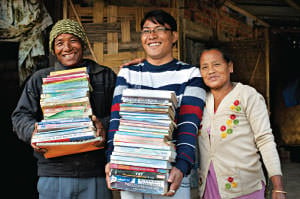
Now a teacher, Roton Ramdey (center) is the pride of his family. Neither of his parents completed elementary school.
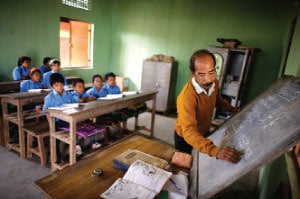
Education is a high priority for village children.
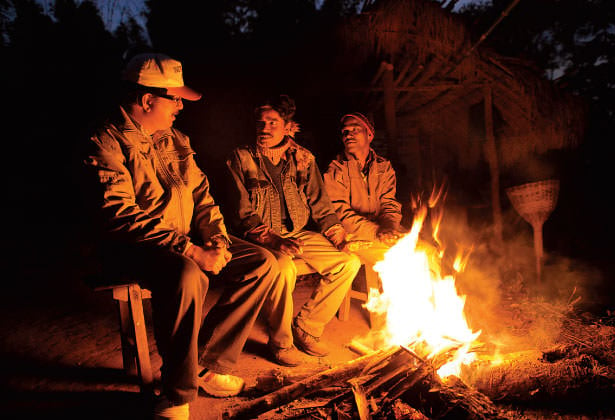
Mukul Borah (left), World Vision program manager, talks to village leaders.
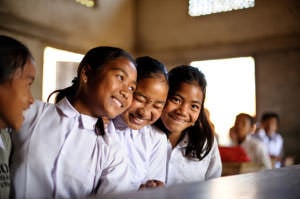
World Vision helps supply school fees, uniforms, and sometimes meals to help children stay in class.
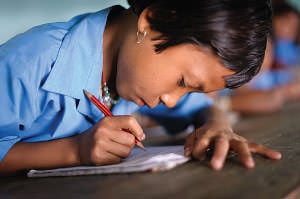
Kurina, age 8, is a dedicated student.
Road to the Future
When asked what World Vision’s greatest contribution through sponsorship has been for these hill tribes, Kati ponders the question and counts off three answers on his fingers. “First, education. Of course, economic development,” he says with a nod. “And the road.”
“This was a neglected place for a long time.”
— Mukul Borah, World Vision manager
The road. Though it’s little more than a dirt track in places, the road connects National Highway 39 to Amri Karbi villages and then winds farther into the hills. As one of the first projects World Vision carried out more than 10 years ago, it was a highly visible promise of progress.
Holding onto the passenger-side window frame of a four-wheel-drive vehicle as it bounces and slides over muddy rocks, World Vision’s Mukul Borah points out piles of gravel at the road’s edge. “The government has taken up road maintenance now,” he says triumphantly. Kati and the council are being heard at the seat of power.
This now-passable road has effectively shortened the distance between the past and the future. Children go to school regularly. Villagers walk to the market weekly to trade. Cattle move aside for motorcycles.
“This was a neglected place for a long time,” Mukul says. In the past, for example, government health workers didn’t immunize children of the hill tribes because the workers had to pay for their own transportation. But then World Vision staff arranged for the health workers to ride along with them to the villages. Now, healthcare is a community priority, health visits occur regularly, and villagers travel down the mountain for more advanced care.
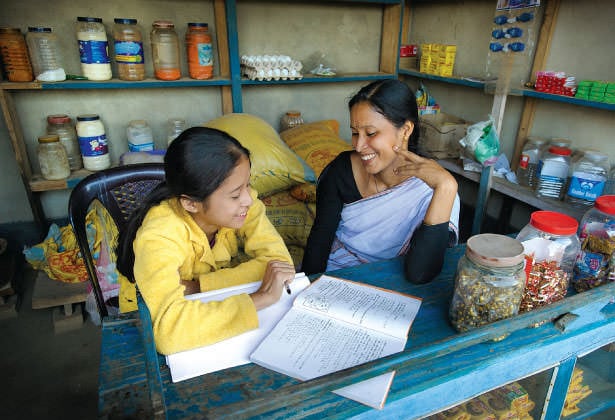
Rodali helps Abha, 14, complete her schoolwork in her small shop.
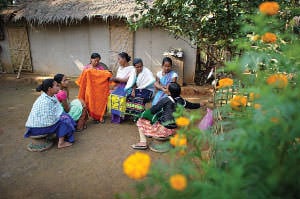
The Junali (moonlight) women’s savings group meets to discuss business plans.
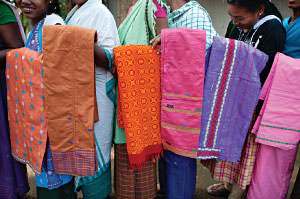
Women from the savings group show off their weavings.
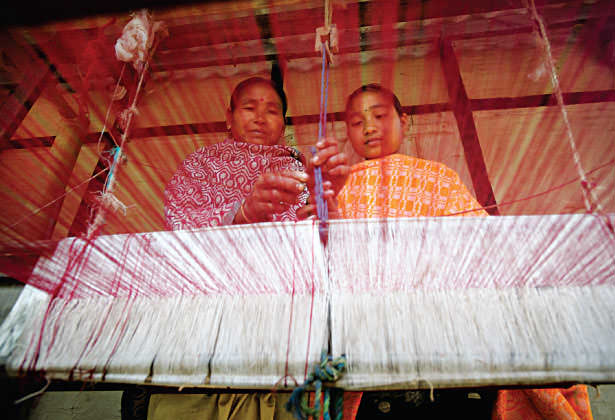
Nabami Rhongchon (right) learns the intricate weaving process from her mother, Mousumi Phangcho.
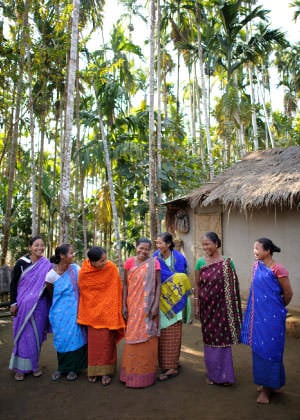
The savings group provides members with business tips — and social interaction.
Empowering Progress
Mukul says that what World Vision provides to help communities set their own development priorities is the “power of the vision.” There is power in giving books to children to encourage a habit of reading or bicycles to girls so they can ride to school safely. Distant possibilities become achievable goals. Education opens up new worlds and makes dreams accessible.
“I want to stock a bigger quantity of staple goods.”
— Rodali Phangcho, store owner
“Education is so important to my family,” says Bhogen Ramde, the father of four sponsored children. His second son, Roton Ramde, 28, is the first person from his community to earn a master’s degree. Roton teaches geography at the prestigious Kaziranga English Academy, a boarding school in Guwahati.
World Vision supplied school fees, uniforms, and sometimes meals that helped Bhogen's children stay in school. But what he remembers most is that someone from World Vision came to their home every month to check that the children were attending school.
Bhogen is president of the village development committee and a revered local leader. He had 400 rubber trees and bought 800 more with his sons as an investment for his children and grandchildren.
Roton’s success is inspiring for all village children. Schooling gives them a boost, while economic development for their parents strengthens their households.
Sponsored child Abha Smitha, 14, dreams of being a music teacher. Her widowed mother, Rodali Phangcho, 33, runs a small shop in her home and earns enough to pay school fees for Abha and her son and weekly music lessons for Abha, who plays harmonium and sings.
Rodali belongs to a women’s self-help group, a self-governing savings club that loans money to its members. A savvy businesswoman, she learned basic business by helping her husband in his small shop. After his death, World Vision helped restock her shop and provided training in entrepreneurship.
Rodali plans to grow her business. She and other members of her self-help group have put in a proposal for a government grant and hope to receive 20,000 rupees each (US$372) for business development funding.
“I want to stock a bigger quantity of staple goods,” says Rodali, gesturing at the neatly stacked shelves around her. Inexpensive snacks make up most of her inventory now, but when she’s able to offer higher-value merchandise, her income will increase.
With shops and rubber trees, as well as fish ponds and orange groves, World Vision is helping Amri Karbi parents give their children the opportunity to reach their goals.
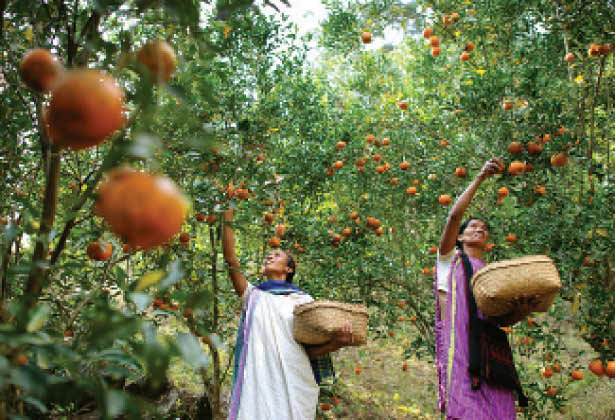
Orange groves are a source of income for savings group members.
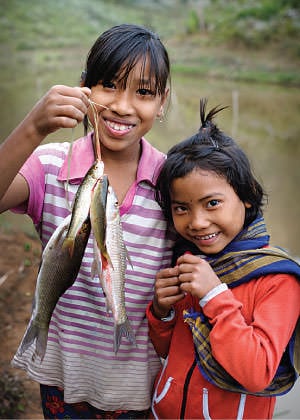
Esther Phangcho (left), 11, and Arje Ingli, 8, show fish harvested from a savings group pond.
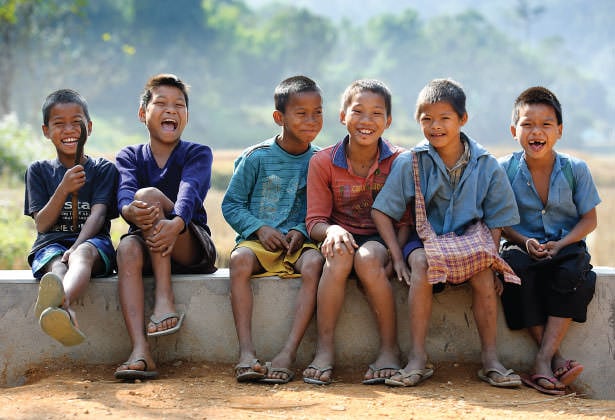
On the road to a brighter future, boys will be boys.
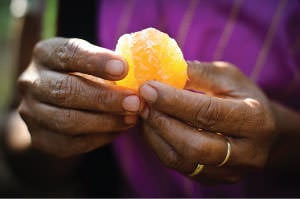
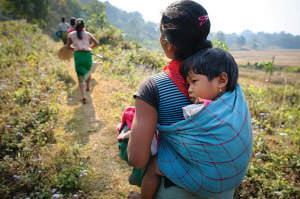
Savings group members trek to the orange groves each day to plant, water, prune, or harvest.
The Power of Prayer
World Vision staff members are committed to praying for the children in this community. Seeing the Amri Karbi Development Council as key to the future development of Amri Karbi people, last year World Vision workers spent a day fasting and praying for it.
In this region where Christians are the minority, World Vision expresses the love of Christ through compassionate acts, training for local churches to care for the poor, and, of course, fervent prayer.
At morning devotions in World Vision’s building in Guwahati, 12 staff members crowd into Mukul’s small office. One by one they mention requests for sponsored children, colleagues, and family members. Then they study Acts 3:1-10, in which Jesus’ disciples Peter and John met a lame man begging at the temple gate. Peter looked at the hurting man and gave what he had — the power of Jesus, which changed the man’s life.
World Vision’s staff in Assam draw on the same power — sustained by faithful child sponsors here, providing a future and hope to children there.
Kathryn Reid writes about international development and disaster response for World Vision.
Joan Nirupa P and Kit Shangpliang of World Vision in India contributed to this story.
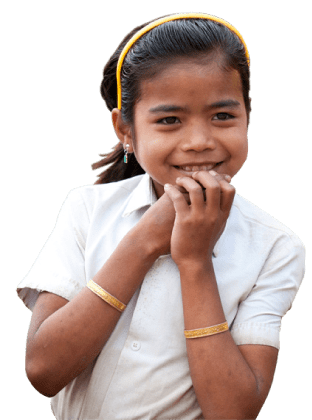
Your sponsorship donation changes lives.
As a child sponsor, your monthly sponsorship gift of $39 will provide one special child — and others in his or her community — with life-changing basics like clean water, nutritious food, healthcare, education, spiritual nurture and more.
Read more stories about World Vision’s work in India »
Sponsor a child today »